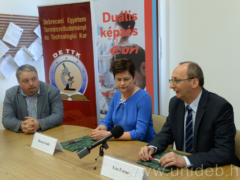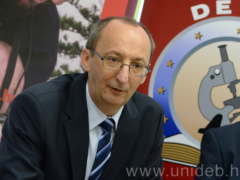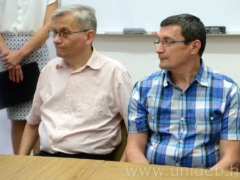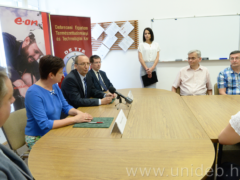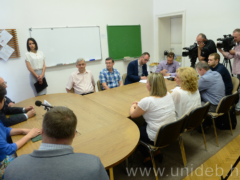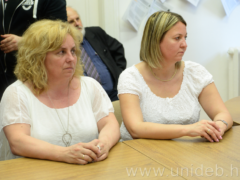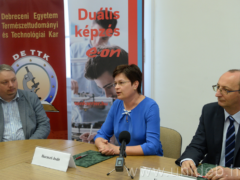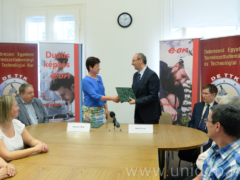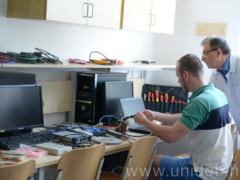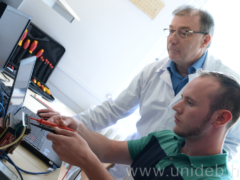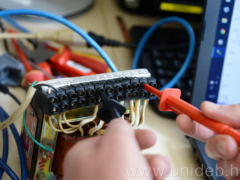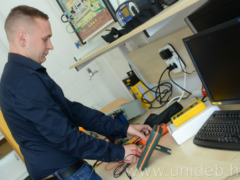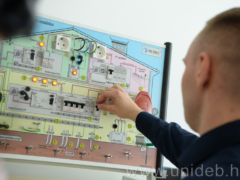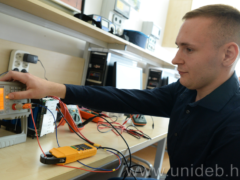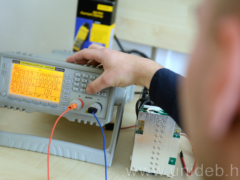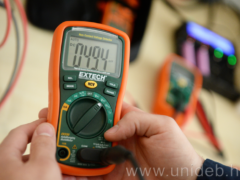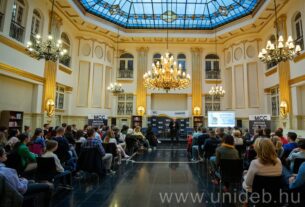– Being a higher education institution providing technical programmes as well, one of the objectives of the UD, and of the Faculty of Science and Technology in particular, is to provide high-quality, practice-oriented education to engineering students in order to meet the demands of industrial companies in the area. This educational approach can ensure that our students enter the labour market equipped with competitive knowledge and degrees – emphasized dean Ferenc Kun at the event that was held at the Bem square building of the Institute of Physics of the UD on 23 April.
The head of the Faculty of Science and Technology pointed out that in the recent decade they have established an extensive network of relationships with actors in the industry with a view to improving the education of electrical engineers. As a result, today they are working together with 30 companies, out of which E.ON stands out. In addition to dual education, the company is also involved in curricular education, and offers topics to students for their degree theses.
– As one of the leading companies in the power system engineering sector, E.ON employs a large number of electrical engineers who studied at the UD. Besides, as a responsible company, E.ON does not only want to make a profit out of the engineering education of the UD, but also wants to take part in it – highlighted Ferenc Kun.
The head of the faculty believes that the establishment of the Department of Power System Engineering is another milestone in this cooperation, which will strengthen the relationship between the company and the faculty. Owing to the agreement, in the future experts of the company may be involved in the development of university programmes, which should pave the way for launching the power system engineering specialisation and the masters programme for electrical engineers, which has already been planned.
In recent years, the number of students choosing the electrical engineering programme has risen continuously with 63 freshmen last year and 88 new first-year students this year.
In her welcome speech Judit Haraszti, CEO of the E.ON Tiszántúli Áramhálózati Zrt., explained that the energy company started to reform its approach to the education of electrical engineers of the future in 2015.
– We soon realised that the key question was what we could do to find highly educated electrical engineers, as the power system engineering sector is facing huge challenges, and it will go through enormous development in the near future. It is important for us to find ever-more innovative solutions and open-minded, inspiring and creative professionals. We are continuously searching for and use solutions that were unimaginable five or six years ago. Electrical engineering is a completely different job today than it was 5-10 years ago – explained Judit Haraszti, CEO of E.ON Tiszántúli Áramhálózati Zrt. She added that comprehensive education and strong commitment still remain core expectations in the field.
The CEO said that the company wants to hire highly trained professionals equipped with up-to-date theoretical and practical knowledge.
– In order to ensure that we will have the best professionals on our team in the future, we are willing to contribute to their education and help make sure that they have everything they need to live up to their potential – said Judit Haraszti, adding that high-quality practice-oriented education also requires cutting-edge equipment, and this is why the company supports the UD in this field as well.
The equipment, 5 million HUF in value, will greatly help launch the power system engineering specialisation, but lecturers involved in the programme will also be allowed to use it during their research. The electrical equipment offered will be used for the inspection and measurement of electrical machinery (transformers, motors, generators), and for research purposes regarding these pieces of machinery.
Press office, unideb.hu










